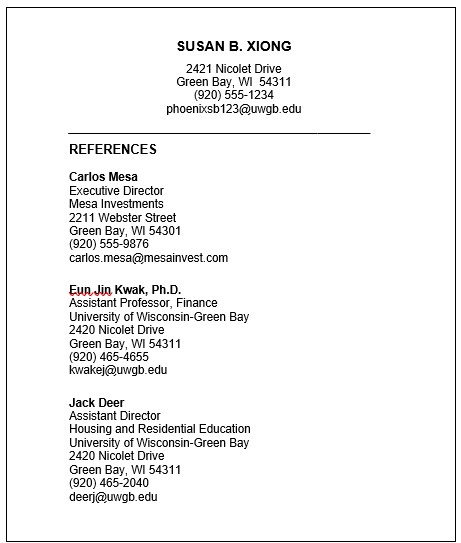References and Recommendations
leverage your
connections
It's not just who you know, it's what they say about you.
A reference is an individual who will speak on your behalf, regarding your qualifications for a position, and can help an employer get a better idea of your skills, abilities, and experiences. Typically, organizations will request that you provide names and contact information for at least three references.

Who to Ask for a Reference
You can ask a variety of different people to serve as a reference for you. This allows you flexibility to select references for specific opportunities. Consider the following when choosing these individuals:
- Who has worked with you directly or witnessed you in settings using skills related to the positions in which you are interested? Examples include current or former employers, teachers, faculty, coaches, or other leaders.
- Can this individual support your application for a job or internship?
- Can they speak positively about your qualifications and realistically evaluate your ability to perform relevant job functions?
- Avoid using a personal reference unless it is specifically asked for by an employer. Personal references would include a friend, family member, friend of the family, and minister or other faith leader.
How to Ask
Always remember to ask for an individual’s permission before listing them as a reference! It is best to ask people to serve as a reference in person, but if that isn't possible, we suggest contacting them by phone or email. Once someone agrees to be a reference for you, verify their title and preferred contact information (i.e., phone, email). It is also helpful to provide your references with an updated copy of your resume.
Creating Your Reference Page
For some job openings you will be asked to provide your references on an application form. Otherwise, you should create a reference page document, separate from your resume, but with matching format and font. You should only submit the reference page with your resume and application if specifically directed to (e.g., "Please submit resume and references to ..."). If not submitted with your application, then take printed copies of the reference page with you to interviews and offer to leave it with the employer.
View the sample reference page below or open the document here.

Letters of Recommendation
Letters of recommendation are typically requested by graduate programs as part of the application process or by selection committees for competitive scholarships, research programs or fellowships. Similar to references, you will want to select individuals who can attest to your relevant skills and qualifications. However, these individuals will be going the extra mile for you by writing a letter on your behalf.
- Select individuals who know you well enough to write detailed letters about your quality of work, professionalism, research experience, future potential for a specific field, resilience or other relevant qualities.
- When requesting a letter of recommendation, be specific about your goals and purpose. It may be helpful to meet with the writer to discuss the program(s) you are applying to and provide them with your resume, a copy of your personal statement or essay, and/or your transcript.
- For most online applications, you will be asked to provide the name and contact information of each individual who will be providing letters on your behalf. When someone agrees to write a letter for you, verify their contact information.
- Follow the guidelines provided by the graduate program. They may specify who to ask for letters, use program-specific forms, or provide questions that the writer will need to incorporate into the letter.
- If someone will be writing multiple letters for you, provide them with detailed information for each letter needed.
- Allow individuals sufficient time to complete your letter and be respectful of their time and efforts on your behalf.
- You may be asked to waive your right to view the letters of recommendation which have been submitted. Consider this when asking individuals to write letters. If you aren’t sure what they will write about you, perhaps they aren’t your best option.
Follow Up and Be Gracious
Send a thank you note to each person who has served as a reference for you or has written a letter of recommendation. Keep them informed of your status, letting them know if you were offered a position, accepted to a program, or selected for a scholarship or fellowship.